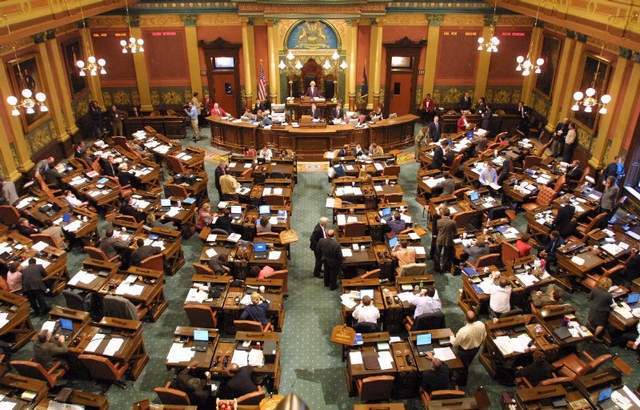As Michigan Republican lawmakers on Tuesday put the finishing touches on circumventing citizen petition drives that were designed to raise the minimum wage and require paid sick leave for workers, it’s now become clear that business groups who donated handsomely to the GOP are the driving force behind this detour.
According to the nonpartisan Michigan Campaign Finance Network (MCFN), the lame duck session of the Legislature has showered attention on a select group of pro-business PACs which contributed at least $1.2 million to state House and Senate candidates in 2018 elections.

These are among the top business PACs that are behind this subversion of the voter petition process: the Michigan Chamber of Commerce, the Michigan Farm Bureau, the Michigan Manufacturing Association, the Michigan Bankers Association, and the Michigan Restaurant and Lodging Association.
What’s more, the MCFN, a watchdog group, found that the Restaurant & Lodging Association PAC, which has led the charge against the $12-an-hour minimum wage proposal, spent more during the October quarter boosting GOP candidates than it had in any quarter since 2010. The association has claimed that the minimum wage plan that gathered about 400,000 petition signatures is “irresponsible and dangerous.”
The House and Senate granted approval to the bills on Tuesday night. The GOP’s goal, to undermine the spirit of the two initiatives that were produced through a hard slog of collecting signatures, is now just a couple of signatures from Gov. Rick Snyder away from success.
One bill would gut the voter-initiated wage change so that the $12 minimum would not kick in for 12 years, rather than the petition drive’s proposal for a gradual increase to that level in 2022. The bill also eliminates adjustments for inflation so that the state’s current $9.25 hourly wage would amount to no increase at all for workers when the $12.05 mark would take effect in 2030.
Another bill would modify the second law sparked by a 2018 petition drive that would guarantee workers up to 40 hours of paid sick leave per year, based on hours worked. But the lame duck bill headed to Snyder’s desk would diminish this earned-benefit process and exempt a majority of business owners across the state.
More than 160,000 Michigan small businesses that collectively employ more than 1 million workers would be exempt from providing paid sick leave to their employees. That’s an exclusion that would apply to any small company with fewer than 50 employees.
In addition, the legislation would cast aside workers who: have less than one year on the job, are covered by a union contract, work part-time, or are employed in fields like truck driving and long-distance sales.
Overall, according to one estimate, the GOP shenanigans in the state Capitol would block an estimated 55 percent of workers from qualifying for the sick leave benefit that was headed for the November ballot.
This post was updated on Dec. 5, 2018, at 10:34 a.m.










Im indifferent to the paid sick leave as i dont know much about it.
However, even if the proposal to delay the wage increase till 2030 is paid by big businesses or not… this is fighting inflation.
If im working a job with a degree that makes me 16/hour meaning that my labor is worth more than my prior job (which i made $10.46 per hour unloading trucks). My wage doesnt go up when the min wage increases. If people who unload trucks have to be paid $12/hr, where does the extra money per hour per worker come from? Meijer might as well be touting the slogan: “Higher Wages, Higher Prices”. and if they DONT wish to put the extra cost onto the customer, we could see automation like we see at companies such as DHL, Amazon and more at warehouses to help cut costs. that also means cutting jobs from people that already pay $15-$18/hr at Meijer’s Warehouses among other things.
We have seen time and time again that increases in minimum wage does correlate with Inflation in prices. in 2006 the price of a Big Mac was $3.15. we had a federal min wage increase in 2007 from $5.15 to $5.85. in 2008 the Big Mac cost $3.57 (1 month before the 2008 min wage increase) in 2010 after 2 more wage increases finalizing around $7.25 the Big Mac costs $3.73. by 2013 with more and more pushes for McDonalds to offer more benefits and higher wages to their employees the big mac costs $4.56 which prompted McDonalds to bring in automation and find ways to lower the cost.
in economics we call this type of inflation as: “Wage Push Inflation”.
To be honest, im surprised a centrist outlet as this one isnt as Libertarian minded but shows a mostly left leaning bias.
Sweeden has no min wage and its the 4th most competative economy in the world and has a thriving middle class and a great free market economy. Businesses are right to complain when the government mandates that the cost of business is to go up because some people wish to virtue signal because they dont understand economics in any capacity.